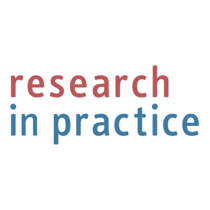Rethinking domestic abuse in child protection (RDAC) is an exciting research project which aims to better understand and improve the national response to domestic abuse and child protection.
A key component of the advanced mixed methodology employed in RDAC is the Community of Practice (CoP), which comprises of representatives from 30 local authorities and voluntary organisations across England and Scotland. CoPs are now used across a range of sectors and typically convene people from different organisations who don’t usually work with one another, around a shared interest in a particular issue or concern. The benefits of regular engagement with one another to problem-solve together and collectively build expertise, offer real opportunities for enhancing aspects of research. This is because CoPs are a unique mechanism for knowledge creation and transfer, organisational learning and performance and for the cultivation of institutional or culture change, in what is understood as a ‘safe space’ for dialogue and constructive challenge.
Led by Professor Brid Featherstone and Dr Jessica Wild, the RDAC CoP builds on the learning from the Research in Practice Domestic abuse and child protection Change Project. Brid, Jess and Professor Kate Morris co-led the Change Project, which ran for 18 months and culminated in February 2021. It aimed to enable new conceptual and practice developments when supporting families where there is domestic violence and/or abuse (DVA). Drawing from international literature, as well as practitioner and family expertise, the Change Project opened new possibilities for understanding why DVA is a key driver of demand in child protection and how it might be responded to by approaches that are more humane and socially transformative than those routinely deployed.
Knowledge from the Change Project informed the development of a range of resources formulated to support practitioners in their work to achieve better outcomes for children and whole families where DVA is a feature. It was also important in the thinking behind the successful bid for funding from the Nuffield Foundation which led to the research programme, RDAC. A key aim of RDAC has been to expand the conversations among practitioners, policymakers, and researchers, and build on the learning catalysed by the Change Project. As such, RDAC has continued to explore questions regarding how we might ‘think and do differently’ when it comes to domestic abuse and child protection using an analytical lens attuned to the intersecting inequalities in the lives of families from across three case study sites in England and Scotland.
Over the past several months, the RDAC team of researchers has completed data collection after conducting interviews and in-depth analysis of anonymised case file data from the case study sites. Throughout this process, they have worked in parallel with family members and the CoP, which has been a key element of the collaborative co-production approach running through RDAC. Providing an integral platform for fostering collaboration, knowledge sharing and ‘sense-checking’ of the data produced, the CoP has enabled mutual learning among key stakeholders and researchers involved in addressing DVA in child protection. Most recently the CoP has offered a critical space for collaborative data analysis, helping the RDAC team to make sense of the data as well as initiating the development of novel practice and policy principles based on RDAC’s key messages.
The Change Project and the RDAC CoP are outstanding examples of the impact enabled through partnership between leading academics, Research in Practice and the practice experts in our Partner network. By leveraging the diverse expertise and perspectives of its members, the CoP has informed and enriched both the qualitative and quantitative aspects of RDAC. Through the mobilisation of participatory informed approaches, it is considered that the collective expertise and experience of CoP members will enhance the validity and relevance of the findings, while also strengthening the ‘real world’ impact and applicability of the RDAC study for both practice and policy contexts.
As we move forward, we will continue to work on the development of the practice and policy principles based on evidence and share the emerging findings at three open-access events to mark the culmination of the project. Tailored for specific audiences, the events will share messages for research, policy and practice.
A series of upcoming webinars mark the culmination of the RDAC project. Each event covers a primary focus on the implications of the project's findings:
There are also several upcoming RDAC resources including a rapid literature review concerning policing, child protection and domestic abuse, and a short film series featuring members of the CoP reflecting the role the group has had in their practice and localised service contexts. Summary reports of the key findings and of the new policy and practice principles for working with child protection and domestic abuse will also be made available once RDAC concludes.
As we come to the end of the funded part of the research, we are planning how members of the CoP can be involved in the dissemination of the findings and will be working with them closely to devise a suite of open access resources that will be available beyond the life of the research.



